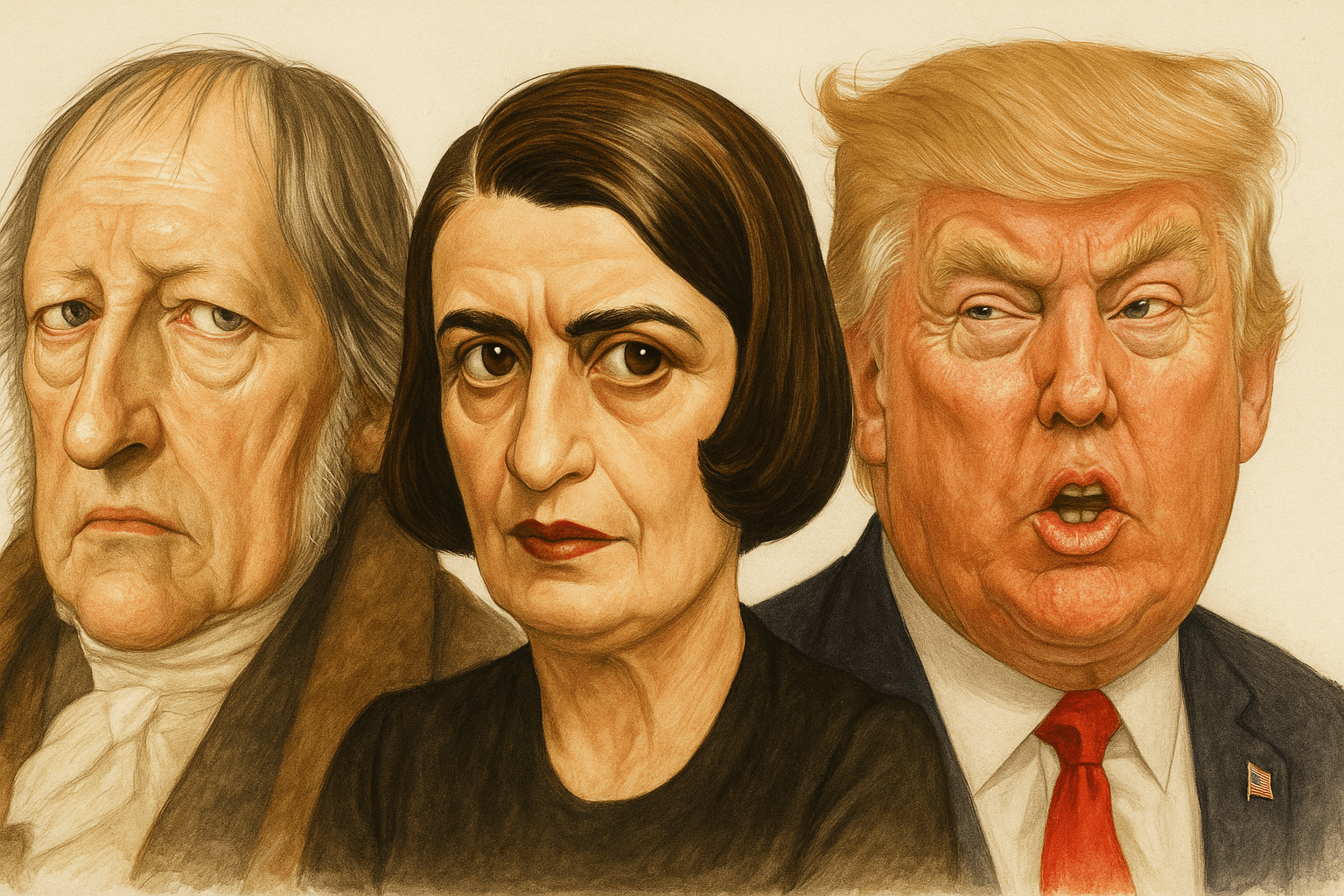
Todd McGowan uses Hegel to refute Ayn Rand
16 May 2025In Emancipation After Hegel, Todd McGowan refutes Ayn Rand’s use of the Law of Identity as the foundational axiom underpinning her political defense of laissez-faire capitalism.
Donald Trump makes clear the political danger of giving free reign to violations of the principle of noncontradiction: one can lie with impunity. But there is an opposite danger that poses a much more ubiquitous threat. This is the danger associated with strict adherence to the law of identity, to the conviction that A = A is perfect self-identity. Ayn Rand takes the law of identity as her political starting point and shows that it licenses the most rapacious capitalism. Rand’s philosophical import lies in her ability to expose this link between the law of identity and capitalism, which appear to have no intrinsic relation to each other. She shows that the law of identity is even more nefarious than the open violation of the principle of noncontradiction. One can identify Trump’s contradictions and use them to discredit him, while Rand’s political philosophy continues its quiet hegemony in the guise of common sense.
But in reality these positions are not opposed at all. Despite Rand’s purported respect for the law of identity, she needs figures like Trump who cheerfully take up contradiction in order to advance her capitalist vision. Trump’s administration brings together the overt violations of the principle of noncontradiction with Rand’s embrace of the law of identity. Trump contradicts himself in order to provide cover for tax cuts for the wealthy, massive deregulation, and the dismantling of the public commons— precisely the political philosophy of Ayn Rand— that the people would not accept without lies like “we’re cutting taxes on the wealthy to help the lowest workers earn more.” No one can be an open Randian and garner public support. No one can politically invoke the law of identity without also relying on overt contradictions.
On the basis of the law of identity (which she attributes to Aristotle), Rand insists that capitalist producers have no responsibility at all to their employees or to the society in which they exist. Each producer is an independent and isolated being that brings value into the world through the creative act. Since there is no possible contradiction, the value that the capitalist creates must belong solely to the capitalist and no one else. Capitalist production creates value without any sacrifice, just as the commodity exists in isolation from the labor that creates it. For Rand, the capitalist creation of value doesn’t necessarily rely on the immiseration of workers as it does for Marx. The production of value has nothing to do with negation because A = A.
The title for part 3 of Rand’s magnum opus Atlas Shrugged is “A = A,” which provides the main through line for the lengthy radio speech that the hero John Galt gives toward the end of the novel. In his speech, Galt praises Aristotle and rejects the existence of contradiction. This rejection is not just a philosophical quirk associated with Rand but the essential core of every capitalist political philosophy. Capitalism depends on subjects regarding themselves as isolated beings whose identity does not involve otherness.
Even Adam Smith, though he lacks Rand’s straightforwardness, theorizes capitalism on the basis of the law of identity. Smith recognizes that labor is the source of value, but he conceptualizes the exchange between the laborer and the capitalist as an exchange between two independent self-subsistent beings. As a result, the capitalist has no responsibility for the miserable situation of the laborer. By the same token, the consumer can enjoy a commodity without any responsibility for the labor that produced it. The isolation of self-identity — the conviction that A = A — keeps the capitalist system operational. Rand lays this bare in a way that others do not. She reveals the hidden link between traditional logic and the justification for capitalism. Her full-throated embrace of both the law of identity and capitalism marks a stark contrast with Hegel.
Hegel’s philosophy of contradiction cuts off the path for the development of Rand’s political program. Granting the necessity of the contradictory role that otherness plays in identity, as Hegel insists, inoculates us to the seductions of Rand’s vision. We recognize that Rand’s rejection of all contradiction is really a rejection of all thought. But as long as we cling to the inviolability of the law of identity and the principle of noncontradiction, the danger of Ayn Rand will always loom. Because it hides itself in the trappings of traditional logic, it is a threat far more ominous than that represented by the open contradictions of Donald Trump. Not only does Hegel’s thought not pave the way for Donald Trump, it has the added benefit of providing a refutation of Ayn Rand avant la lettre.
Source: Emancipation After Hegel, pages 32-24